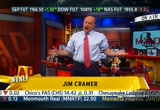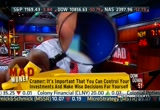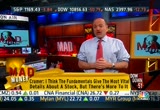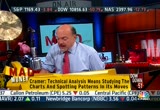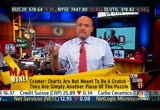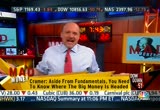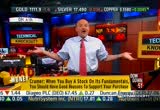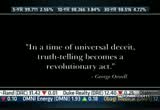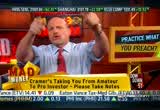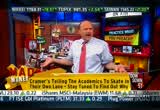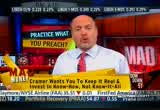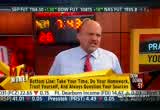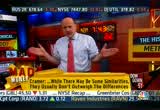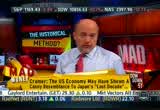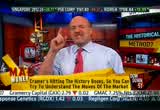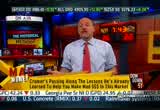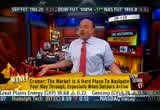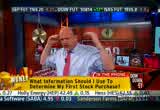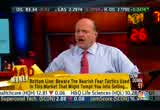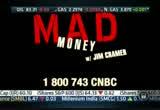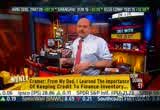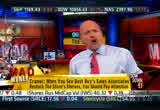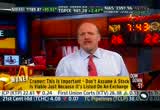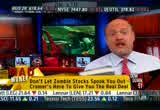tv Mad Money CNBC March 31, 2010 11:00pm-12:00am EDT
11:01 pm
11:02 pm
>> firms are going to go out of i'm jim cramer, and welcome to my world. >> you need to get in the game! >> firms are going to go out of business, and he's nuts! they're nuts! they know nothing! >> i always like to say there's a bull market somewhere -- >> "mad money." you can't afford to miss it. hey, i'm cramer. welcome to "mad money." welcome to cramerica. other people want to make friends. i'm just trying to make you some money. my job is not just to entertain you but to educate and coach you. so call me at 1-800-743-cnbc. one of the most important parts of investing is simply being able to find out the real truth. that's right. to put on your sherlock holmes cap and start -- look. wow.
11:03 pm
sort out the useful facts from the false leads and misdirection. if you want to make some moolah managing your own portfolio of stocks, you've got to be a good detective. so tonight i'm focusing on the csi -- i'm focusing on the "law & order" side of investing and teaching you how to get to the truth about your stocks and the overall market. at any given time the airwaves can be chock-full of people who are either deliberately or accidentally trying to mislead and misdirect, because sometimes people take commentators more seriously when they have a negative bias. you will be exposed to countless bogus arguments. and these are often coming from sources who you would think would be the most credible out there. >> boo! >> now, i come out here every night and do my best to help you sort out what's relate rigorous analysis from what is just plain garbage. but at the end of the day you
11:04 pm
need to be able to make these judgments yourself, on your own. so i'm sharing some of the lessons that i've learned in more than 30 years of trading and investing to help teach you how to arrive at the truth about individual stocks and the whole market. what's my goal? to empower you. to give you the tools and advice you need to do your own investing detective work. while taking advantage of my experience as a grizzled veteran of the markets. so let's get to work. when it comes to analyzing stocks, i'm what's called a fundamentalist. i want you to think more about warren buffett and benjamin graham and not so much about jerry falwell or the ayatollah khomeini. that means i believe the best way to divine where a stock should be going is by analyzing the facts about the underlying companies and its future, the prospects. now, i'm always telling you to
11:05 pm
do your homework, and that means, again, reading the company's earnings releases, going over their s.e.c. filings, and by far the most important, listening to the conference calls. those quarterly conferences are available everywhere now. all this stuff, i know, part of the boring, even quotidian, to use an s.a.t. word, side of stock detective work. it's the basic just the facts, ma'am. a little "dragnet" style work. you can't do without it. sorry. but just because the fundamentals tell the most important part of a stock story, that doesn't mean they're the whole tale. there are other ways of unraveling the truth about a stock's trajectory, and they're worth heeding. here's one. since the show began, i didn't used to talk about it. but during that great crash i spoke about it and realized i had to talk more about it. i'm talking about -- i'm talking about looking at the charts. that's known as technical analysis.
11:06 pm
in fact, in rule number 9 of any one of my -- no, rule number 9 of my most recent book, of post-apocalyptic investing in "getting back to even," it's simply that the technicals matter. and that's why i do the "off the charts" segment every tuesday. this little piece is devoted to understanding the work of various different technicians and comparing it with my opinion of the stock's fundamentals. i love the battle of ideas. the technicians come in. i come in. best man win. worst man -- yeah. it's all in here. now, a lot of investors rely entirely on the patterns they've seen in the charts to predict where stocks will go in the future. entirely. and i think they simply rely on them too heavily. technical analysis has an important role. it shouldn't be ignored. i look at them all the time. but you also need know it is not a replacement for good old-fashioned homework.
11:07 pm
it so much easier, too. you can't use the charts as a way to bypass doing your research about a company's fundamentals. not even the cliff notes of investing. nevertheless, technical analysis, i'm giving it its due. it's a useful tool. now, i know that too many of you are trying to divine a stock's future moves from those pictographs of its past action, and sometimes i think it's perilously close to astrology or voodoo or maybe mumbo-jumbo chicken gumbo, the kind with the stars in it. but technical analysis done by an expert can be every bit as rigorous as a fundamental analyst. you just have to understand the limits of what it's telling you. look, we know that at certain times far more important to stock prices than the prospects of the actual companies is what the big money guys, those big mutual funds, those big hedge funds, what they're doing with their shares. unfortunately, because of the secrecy of wall street, you can't just call up your broker and say, hey, is that fidelity or state street or t. rowe, legg mason, is that alliance or
11:08 pm
janus, is that who's buying or selling-s that who's knocking the stock down or taking it up? that's confidential information on wall street. and your broker would get fired. he would get fired if he revealed it to you. and that's really, really important because i think many of you think that when it comes to the rules of wall street you're using the official guide to wall street's ethics. not the case. this is the real deal. think of the technicals as your substitute for direct knowledge of what the big money is thinking. given that these funds control so much of a stock's trading, listen, it's just foolish not to know what they're really up to. and anything that can help you find out is worthwhile. the chartists give you the next clues to detect their actions. so what does this mean precisely? good technicians, people like dan fitzpatrick, my colleague at thestreet.com's paid sister site real money, they can tell when you a stock's big institutional buyers have become exhausted, meaning they're sick of paying for stocks, or they're running
11:09 pm
out of money to pay with. you see the chart taper off. that's them done buying. they try to figure out when the big boys are finished selling too. all by looking at information that's hidden plain sight to them in the stocks action through a process that's kind of like ratiocination. that's similar to what edgar allan poe used to help find the purloined letter. not only does this help them determine when big moves stop and start they can have advance warning of big news coming before the rest of us have the slightest notion of what that news might be. for example, fitzpatrick from realmoney predicted an up side surprise following a major rally in big lots, the nation's largest closeout retailer, just the day before the company reported based purely on the technicals. i, unfortunately, had gone to my big lots, thought it was sloppy, there were a lot of cheetos in the check-out aisle. i didn't know if there was like a bag of them all over the place.
11:10 pm
and i said ixnay on big lots. no, i should have listened to fitzpatrick. i should have listened to rick bensignor, another great technician, who named the bottom in bank of america for nearly a triple in less than three months. right on the show. along with the market's bottom in early march of 2009. fitzpatrick's work detected a huge mutual fund buy on every dip. bensignor's work enabled him to see that at $3 the bank of america sellers were just plain spent. they were exhausted. they were finished dumping their shares. they were at the finish line at the big marathon. when you're trying get to the bottom of what's happening with a stock, you want the complete picture based on the best information you can get your hands on. as an investor researching the company behind the stock lets you know whether that stock is worth owning and at what price. over the long run it's things like growth and the strength of the underlying company that determine the trajectory of a stock. the charts can't help you there. but at any given individual moment the buying and selling of the institutional money managers
11:11 pm
determines where the stock is going in the short term. and the technicals are the best way to get inside the heads of the big boys. and that's a tool worth using. mega caveat. you should never buy a stock based solely on the technicals. never. because if it fails to go up you have absolutely no reason to own the thing. in fact, if a stock's price fails to hold at its support lines, the technicians say you have to sell the thing. even if the actual company's doing very well and deserves to be bought based on its prospects. here's the bottom line. when you buy a stock because you like the fundamentals, you have a good justification for buying even more as it goes down. that's one of the many reasons why we always fall back on the fundies and do the homework first. with that in mind, though, you want to have an understanding of what the big institutions are doing? you should listen to experienced technician or even learn how to analyze the charts yourself. to have a better idea of when to buy or sell your stocks. terry in pennsylvania.
11:12 pm
terry. >> caller: hey, jim, how are you doing? >> not bad, home stater. speak to me. >> caller: a boo-yah from ohio state university. i'm in enemy territory. >> well, that's okay. pennsylvania and ohio, i still think it's really kind of a one country theme. but i understand sports. go ahead. >> caller: you have talked in the past about buying quality stocks not in favor, but one of the things you talked about was trying to find the insider traders when they're buying large blocks of a stock. >> right. >> caller: and i don't know how to find them. how do you -- >> yahoo finance has them. i like to hit up a stock and see what they have. they always list insider buying. you've got to do that. now, remember, people sell for a million reasons, they've got estate planning, divorce, whatever. people buy for one reason. they think the stock's going higher. let's go to john from missouri. john. >> caller: jim, thank you for taking my call. and thank you for being such a
11:13 pm
workaholic. >> i am too much of a workaholic. all my 17 doctors tell me that. so go ahead. >> caller: yes, sir. i'm new to options and i've been reading your book, "getting back to even" -- >> yes. >> caller: -- with an emphasis on the options chapter. >> oh, man. i never talked about options before. i did it in this. a lot of people think it's too hard. well, of course it's hard. we've got to make money. sometimes that's hard. go ahead. >> caller: i put in the time. i think i understand it. my question, sir, is if i'm long the call in my one account and i've got a nice profit in it and decide to short the common, why do i need the second account, sir? >> okay. because if you put it in the first account, let's say one's the type 6 account, one's a type 7, those are the words we used at goldman sachs, they're automatically netted out. you can't stop yourself. in other words, if you short the common in the same account as the option, as soon as expiration occurs that trade is gone. i don't want that to happen. i want to keep the short open so you can roll over the call. that's why it's got to be in two separate accounts.
11:14 pm
that has been the single biggest question people have asked me about the chapter. i'm glad you asked me, sir. that really helps. remember, if you want to make money managing your own portfolio, you've got to be a good detective. and find the fundamental and the technical reasons to buy and sell stocks. "mad money" will be right back. open the door fed window, and he has no idea how bad it is out there. no idea. they are nuts. they are nuts! they know nothing. where the heck is the fcc? what are they doing? how can we have levels of fictions in pfinancials after sarbanes-oxley. >> i am taking on a new issue and socially suicide one and in fact, i am about to get myself banned from every single good party in the new york metro area. miss out on the "mad money"
11:15 pm
get your alert at mm to 26221 to get cramer right on your phone. for more info go to madmoney.cnbc.com. or give us a call at 1-800-743-cnbc. aflac is not more benefits at greater cost to your company insurance. aflac is not how do i fit it in my company's budget insurance. aflac is help protect and care for your employees at no cost to your company insurance. with aflac, your employees pay only for the coverage they want or need. and, the cost to you - nothing at all. if all you know about us is... duck: aflac! ...then you don't know quack. to find out why more businesses provide aflac, visit getquack.com.
11:16 pm
11:18 pm
tonight i'm devoting the whole show to teaching you how to be a better stock detective. so you can sort out fact and fabrication and investigate what really matters to the market. not just what the commentators yack about and say is important. if you want to get a good handle on what's happening with stocks, at some point you need to ask yourself who's worth taking seriously? who is worth listening to? a lot of people get to use the media to broadcast their opinions about the market to a huge audience, even though many of them don't even necessarily know what they're talking about. when you're trying to put together your own view of the prospects of the economy or the stock market, it's always worth taking advantage of other people's good ideas, but there is a real danger, because the most convincing or the influential commentators are not necessarily the ones who are
11:19 pm
right or even respectably or rigorously wrong. now, i can't tell you who to trust, but i can warn you about the dangers about putting your faith in academics, a mistake far too many people make to their portfolio's detriment. like i tell you, in get "getting back to even," where i'm very tough on the academics, just because a ph.d. or nobel prize in economics doesn't mean -- just because won something like that doesn't mean they have a clue about investing. of all the armchair players who constantly opine about the stock market in the press, the prof sor -- professoriate is the most dangerous. they're all so articulate, so intelligent, very credentialed. in short, they're capable of being very convincing while at the same time they rarely have any skin in the game, which means they know little to nothing of how the stock market actually works in practice and not much more about the
11:20 pm
real-life operations of corporations or the nitty-gritty details of the economy or of course trading. boy, do these guys hate me. academics have maximum influence but minimal understanding, which is why you have to be incredibly wary when you listen to anything they say. as a general rule of thumb i think the further somebody is from the ivory tower the less they understand about the workings of the market. sorry. can i just say one thing? if i was offered a professorship, i swear to god, people would trust me more. and i'm still the same guy. and i have been offered. there. don't get me wrong. i'm not trying to polish my anti-intellectual bona fides. or to demean academia or the study of economics. it's just that i think being a professional economist has little or no relation with being a professional investor. there just isn't much crossover for the most part. yet you will almost never hear anyone admit that in public. and economics professors are often treated like they're stock market experts. gurus. let me put it this way. if i started critiquing academic papers in peer-reviewed journals of economics, then most people would correctly write me off as someone without the necessary experience to be taken seriously in that venue. but for whatever reason
11:21 pm
economists can come on and talk about stocks, and they're shown enormous deference when the fact is that the nobel for economics is about as relevant to investing as the nobel in physics or the nobel peace prize. the professors have become a confusing factor that we have to factor into the mine field of the investing landscape. you have to rule them out before they do too much damage to your portfolio with what i regard as their endless misdirection plays, to talk about football terminology. unlike the professors, until they -- well, until they've got some skin in the game, unless they invest in stocks themselves and have plenty of experience as investors and of course they disclose that they're doing so and disclose their positions and disclose their exposure, if they do then you should take everything they say with a grain of salt or perhaps a box of morton's, whether it's coming from a professor of economics or marine biology. during the financial crisis professors like that nouriel roubini and nobel prize winner paul krugman were some of the loudest proponents of nationalizing many of our
11:22 pm
largest banks based on the premise that they were insolvent. although they never had to account for their views in retrospect, they ended up looking pretty silly when every major bank that needed money was able to raise private capital after the treasury department's stress test, much derided by the academics, including some of the most troubled of the regional banks including fifth third and huntington bank. even if the facts hadn't made that entire line of argument irrelevant, i don't think the professors ever understood the far-reaching and calamitous effects of nationalizing the banks, simply because again, they never had any real skin in the game, they had nothing to worry about. in the most charitable possible interpretation they were looking at things from the perspective of an economics professor, and despite how often we conflate the two that's very different from the perspective of you as an investor. with bank nationalization as with many of their arguments i just don't think these guys were able to see the consequences of what they were proposing. even if we make the absurd assumption that the government would have done a totally bang-up job operating a bank
11:23 pm
behemoth of byzantine complexity. hey, citigroup, bank of america. by nationalizing a large bank we would have wiped out a lot of holders, the preferred shareholders, bond holders, and we probably would have crammed down all, all of that senior debt. since preferreds are also one of the main ways banks go about financing themselves and since other banks are the largest holders of preferred stock in american banks, followed by many pension funds, i can only imagine what the collateral damage would have been from any nationalization scheme. it would have caused as much pain as a half a dozen lehman brothers. i'm not sure that the professors who demanded nationalization ever had any idea that nationalization, which by the way worked in sweden, a country about the size of the state of georgia, could have turned the whole world asunder. they just didn't get it. we would never have recovered, let alone had the gigantic rally we caught in 2009 off the generational bottom. at the end of the day when you're trying to decide who to take seriously, remember that people who don't invest actively just care less than those who do.
11:24 pm
so therefore, they don't do as good a job. if you don't have any money on the line, then not only can you afford to be wrong, that's one of the reasons why so many professors get away with telling you to stay on the sidelines during the huge rally of 2009. but you can also promote disastrous public policy without having to worry about the consequences, at least when it comes to your portfolio. hey, or how about another oh, so brilliant idea supported by the academics, one that almost destroyed the capital markets? the notion that many of the rules put forward after the great depression to curb outrageous short selling didn't matter anymore. of course, their work was completed during the most spectacular bull market in history and it led to the repeal of the uptick rule. the uptick rule -- how could they repeal it? that was a fabulous defense against bear raids, because it kept shorts from smashing down stocks and forced them to wait for natural buyers to come in and pay up -- >> buy, buy, buy --
11:25 pm
>> before unleashing -- >> sell, sell, sell. unleashing a torrent of selling. seems to me the s.e.c. put far too much faith in these armchair quarterbacks too. just another case of the rigorous sports being more persuasive than the rigor of business. we can't ban professors from opining by sentencing them to the library and academic journals, darn, it but we can have a rule that no one should take them seriously unless they become practitioners of the game. here's the bottom line. be careful not to give too much credence to academics with impressive credentials but having little real investing experience. let's just say with why don't you be a little cynical and skeptical about what they have to say? after the break i'll try to make you even more money. cramer has gone global. his top stories and lightning round to go and mad money videos. all that and more. go to mm.cnbc.com. don't miss a second of cramer. now you can find each full
11:26 pm
11:27 pm
toys ! the system can't process your response at this time. what ? please call back between 8 and 5 central standard time. he's in control. goodbye. even kids know it's wrong to give someone the run around. at ally bank you never have to deal with an endless automated system. you can talk to a real person 24/7. it's just the right thing to do.
11:28 pm
hi, may i help you? yes, i hear progressive has lots of discounts on car insurance. can i get in on that? are you a safe driver? yes. discount! do you own a home? yes. discount! are you going to buy online? yes! discount! isn't getting discounts great? yes! there's no discount for agreeing with me. yeah, i got carried away. happens to me all the time. helping you save money -- now, that's progressive. call or click today.
11:29 pm
bet you thought you would never need the skills of a gumshoe, p.i., regular old sleuth to make money in this market. well, you do. and tonight i'm giving you the tools you need in order to perceive what's really going on and at the same time avoid falling into some of the most common pitfalls when it comes to assessing the state of the economy and the market. you can't make smart investing decisions if you get taken in by the fear mongers. the fearmongers, you know what they're doing? they're always trying to scare people about where we are. nobody ever made a dime panicking. one of my cardinal rules from "real money: sane investing in an insane world." now, there will always be bears out there trying to frighten you. and sometimes they'll even be right. but there's a species of specious argument that a lot of people get taken in by, and i want to free you from that right now. do not buy into the hysterical
11:30 pm
historical analogies, the most common being that the u.s. just like japan during its lost decade, when our economy slows down, or the u.s. on the verge of become the weimar germany when inflation heats up. these are two nightmare historical analogies that the bears love to invoke. and it's really just going to frighten anybody who listens. these comparisons may seem compelling, even authoritative. but when you look below the surface, neither one makes any sense. on "mad money" we're all about rigor, substance, capabilities. the japan or weimar analogies are all about generating maximum fear with minimal standards of proof. you need to be able to recognize when someone's trying to put one past you using an historical analogy, if only so you don't get caught up believing it yourself. ever since the financial crisis started in 2008, even as the economy's begun to recover, we've been dogged. we've been dogged by arguments that the united states was
11:31 pm
repeating the japanese lost decade experience of the 1990s, where for about ten years after japan's stock market crashed that country's economy experienced little or no growth. sure, there are similarities between everything, between these two situations, brutal downturn in real estate, japanese financial system collapse, banks hobbled along with government-supported zombies for a decade of almost no economic growth. the japanese economy hasn't recovered for very long when the latest crisis hit and everything came tumbling down all over again. japan's nikkei 225 index that measures the performance of the tokyo stock exchange declined by 82% from its peak at 30,915 in december '89 to its trough of 6,994 in october of 2008. at beginning of 2009 the parallels were pretty striking but the we are japan argument kept you out of one of the greatest rallies in u.s. history. and it was always wrong to begin with.
11:32 pm
the u.s. is very different from japan, always has been, always will be. our businesses made the hard call and quickly cut back on their inventories while in japan they just prolonged the downturn by refusing to take the tough measures that were necessary. and on top of that consumer spending in our country rebounded much more quickly than in japan's case. they never started spending over there. looks like we never stopped here. and that's great for our economy. the fear and the hoarding produced in japan along with the insistence of propping up all the banks including the ridiculously insolvent ones is the toxic brew that we now know isn't being sipped at the u.s. bar. all of our large banks that needed to raise capital, the private capital, unlike japan's where they stumbled along like the living dead have raised it. japan's banks refused to recognize huge losses for years while we made the worst of our banks eat their losses pretty quickly. plus there are huge structural differences that's make any kind of historical analogizing with japan totally bogus and
11:33 pm
unbelievable. the main difference is demographic. japan's economy could sit in neutral for years because japan's population is stagnant. from 1980 to 2008 the population in japan grew by just 9%. and it's projected to start decreasing, decreasing in the not too different future. the u.s.? in the same period our population grew by 34%. the very fact that we have more and more people gives us more and more resources and puts enormous pressures on our economy to grow. japan did not and does not have that. some of the reason is their lower birth rate. but most of it has to do with differences on immigration policy. ours is generous. net migration to the united states is 4.31 new immigrants for every 1,000 members of the population. in japan that number's near zero because their immigration policy's so restrictive. and it's not just the number of people. it's also how old they are. in america the average age is 36.7 years. japan, 44.2 years. japan is a country with far, far more senior citizens. that means lots and lots of retirees. people who aren't producing that
11:34 pm
much for an economy and are afraid to spend. america's a much younger country. our economy is not that dependent on exports. japan is almost totally export-oriented. totally different situations. saying that we're going to have a lost decade because it happened to japan even though structurally our two countries are incredibly different and even the apparent similarities start to fade when you look closer, is nothing more than an argument by analogy totally without rigor that the bears have used to club the stock market lower. don't let it panic you. as it's panicked thousands of investors who look at the charts of the japanese stock indices and just want to panic us out. even as the two truly have little in common with one another than the pictographs of the action sort of look familiar. weimar, german republic, by comparison the idea that the united states is about to experience a level of hyperinflation that will destroy the real value of equities and dollars and wreck our purchasing power because our government's been borrowing and printing so much money is another canard. you don't get from increased commodity prices which are
11:35 pm
largely a product of phony demand as far as i'm concerned from hedge funds speculating on the price of raw materials and not real demand and a slight increase in treasury yields, it's barely noticeable on a 10-year chart, to hyperinflation even when this was the worry du jour. and frankly you can't go from severe deflation like during the great depression to hyperinflation without some growth happening in between. but since the hysterics want to up the emotional ante and create panic they stick with weimar and japan analogies. now you know why you don't have to take either argument seriously. here's the bottom line. the simple truth is the analogists can never be appeased. there's always some negative analyst making it seem like you have to sell. i say sell when our fundamentals are faltering, not when the bears are trying to freak you out by drawing a comparison between the u.s. and some historical crisis in another country. gus in texas! gus! >> caller: boo-yah, cramer! >> boo-yah, gus.
11:36 pm
>> caller: my question is i'm new to the stock market and i want to know what kind of research and tips should i buy -- know before i buy my first stock? >> let's see. okay. the first thing i want you to -- and look, i have to tell you, i detail these things both in the book "real money" and in the book "getting back to even" what the course of action would be. but i'd like you to look at the balance sheet -- look, go pick up the annual. let's start there. let's start with the annual, then go to the quarterly reports, and then look at the conference calls, watch the tv shows, go into cnbc.com, see what we've talked about. yahoo finance. maybe thestreet.com, where i'm chairman. that's how you get your feet wet, and i think that will work. larry in minnesota. larry. >> caller: hello, jim. how are you doing? >> not bad. how about you, larry? >> caller: great. this is larry from minnesota. i'm sending you a florida vacation boo-yah, jim. i'm down here getting warm. >> well, good for you. good for you. thank you. thank you, sunshine. >> caller: jim, the uptick rule
11:37 pm
was put in after our last recession, and for 70 years it worked beautifully. and since july of '07 when they took it out our market's been anything but stable. i've been trying to call my politicians, tell them to put it back in and whatever. tell us why we need this to stabilize our markets. >> well, we need it because it's very easy to rumor down companies. it's very easy for people to decide to take a stock down. and the way it works the old days was you had to find a buyer who was willing to buy at that price or above, and that made so much sense because it made it so that you couldn't just knock down bids all the way through in a rush, in a group move. and that's what happened during 2008. and it was because the government felt that that could never happen again. you can't repeal the nature of human beings. tim in new york. tim. >> caller: yeah. yeah. hi, jim. >> tim, how are you? >> caller: hey. jim, i'm a big fan of warren buffett and value investing and
11:38 pm
you say all of this like buy a stock and you have to do all of this and watch it and watch it and do your homework, but i'm a fan of buy and hold like warren buffett and i think the strategy works. >> well, he doesn't buy and hold. he buys and if he doesn't like the stock or if he thinks the fundamentals have changed he sells. i think the idea that he does buy and hold is actually -- does him a great disservice. what he does is he buys and does homework, and when the homework says the facts have changed then he bails. and he does bail from a lot of stocks. let's keep that in mind. all right. don't buy into fancy historical analogies. especially between the u.s. and japan. the u.s. and weimar, that isn't going to happen. stay with cramer. >> we've been on a crusade on this show. >> you were one of the first people who spoke about the uptick rule. >> a crusade to bring back honest short selling. the s.e.c. tossed these stocks into a virtual free fire zone. >> i have to concede that in the kinds of environment we've seen more recently that it may have had some -- if it had been in effect it might have had some benefit.
11:39 pm
>> i rest my case. he is the most trusted man on wall street, and now he can be yours. >> i want to introduce you to a friend of mine. >> he is so fun. >> i watch him everyday. >> they know nothing. >> are you ready, skee-daddy? >> i am a proud cramerican. >> i couldn't have said it better myself. >> order cramer's new bobblehead today. >> and buy, buy, buy. >> at the cnbcstore.com.
11:42 pm
how can you tell when a company or a whole industry's about to turn a corner? where should you be looking for evidence to prove a company's prospects are improving? you teed to know how to investigate these situations and find the truth. and when it comes to a turnaround, whether we're talking about retail, housing, technology, or commodity producers or automobile makers, then few things are more important than inventory. that's right, inventory matters in a huge way.
11:43 pm
and that's even more true when credit is tight. this is a lesson that my dad taught me when i was a kid. but i didn't realize just how far reaching the implications were until the credit crisis set in and it became harder for companies to borrow money than at any other point i can remember in my 30 years as an investor. when i was a little boy, my dad used to take me to a place he called the place. that was his warehouse. where to this day he sells wrapping paper, boxes, plastic bags, jewelry boxes. 2.2 by 12 shirt boxes. he would always work hard through christmas season and sometimes when we'd go somewhere after christmas, the place he'd spent seven years -- sorry seven straight weeks driving his station wagon to retailers to meet their holiday paper demand and we would look upon the enemy he would survey it, the nemesis, the nemesis of all business, the excess christmas inventory. we'd see reams and reams of christmas paper that hadn't been sold. and i'd say dad, so what?
11:44 pm
you'll sell it next year. and my father would sit there and patiently explain to me, what he described as the most important thing i would need to know about business, that inventory has to be financed. you've got to finance inventory. you've got to pay the banks. you have to keep credit to keep inventory. that no business has enough cash on hand to pay for excess inventory. and now he'd have to sell this christmas paper for much less than he bought it for simply because he couldn't afford to finance it. until he did he couldn't bring in any valentine's day paper or wedding paper or easter or mother's day paper. any business that's not a pure service provider, any company with inventory faces this exact same dilemma. if you want to know when an industry's going to recover, if you're looking for a bottom, you need to look for companies that are working off the equivalent of my dad's gift wrap dilemma. businesses can't improve until companies work off their excess inventory, until they get rid of the enemy, inventory. they need to put their version
11:45 pm
of the great christmas paper inventory glut behind them. when companies have too much inventory, they have to dramatically cut prices, which is why excess inventory is such a bad sign and shrinking inventory is so bullish. excess inventory, discount. now, normally these industries will bottom when they've finally gotten rid of the excess inventory. then they can start ordering again. >> buy, buy, buy. >> this inventory cycle bottom is what caused people to realize that the semiconductors literally after years of being overinventoried hit a bottom in january of 2009, then started going up beautifully in march. in fact, the first company that saw a bottom was the lowest level one of all. this little company called taiwan semiconductor. they make simple chips for tvs and cameras. when the company had too many semis, it had to dump them at below cost. when customers finally cleared their own inventory, taiwan semi was finally able to charge full price for chips. there weren't enough around that it had to discount anymore.
11:46 pm
in short, for taiwan semi, all of its christmas paper had been sold. and so had everyone else's. when best buy says that its inventories are low enough for it to begin restocking its shelves, that helps everyone on down the tech food chain as the companies that sell to best buy placed more orders with their component suppliers and so on. you've got a bottom in everything from corning, which makes the glass for computer monitors, to apple and texas instruments, the guts of most modern cell phone handsets. of course we need to see more than just lower inventories before we know things are getting better. during the credit crisis, when banks were desperately struggling to raise capital and didn't want to lend because the outlook was too bleak, there was a wrench in the gears. even when companies worked off their old inventory, they couldn't start doing much better until the banks were healthy enough to lend them money to finance the new stuff. so the semiconductor stocks ended up having to wait for the banks to recover before they could participate in a huge new cycle. that's not a problem you're likely to encounter very often, but it just goes to show how
11:47 pm
critical the banks are to the whole process. here's the bottom line. if you want to get a good read on a company's prospects in every sector from tech to retail to housing and autos, look at its inventory. too much and you've got trouble. earnings estimates coming down. and remember, that getting caught with excess merchandise at a time when credit is tight is the nastiest place of all to be in. david in arizona. david. >> caller: hi. >> david, how are you? >> caller: welcome from sunny phoenix, arizona. >> man, i never knew anything other than sun there. what's up? >> caller: jim, something i've always wondered about. when a lot of naked short selling was going on in 2009, hedge funds and others, if the traders held the position on the x-dividend date, did any money change hands, or was there any kind of accounting? >> oh, they did. they had to pay that dividend. it didn't matter if they were naked or not. that got to them. believe me. they were tracked down. most of the things they were
11:48 pm
naked shorting did not have dividends, but they had to borrow -- they still had to create that stock somewhere, and that stock had to have the dividend created. i don't know of any instance where it wasn't. inventory, it's the enemy. you don't have enough of it, you're in great shape. stick with cramer. you want to push cramer's button, use the mad money soundboard at madmoney.com. from hallelujah to -- >> [ baby crying ] >> to -- >> they know nothing. >> listen to the sound evidents by going to madmoney.cnbc.com. and now you can send a text to your phone to get your mad money recap right in the palm of your hand. it's monday,
11:49 pm
some people will stick with their old way of getting vitamins and minerals. others will try incredible total raisin bran. with 100% of the daily value of 11 essential vitamins and minerals, juicy raisins and crunchy whole grain flakes. guess it's all about what kind of crunch you like. how are you getting 100%? but we're also in the showing-kids- new-worlds business. and the startup-capital-
11:50 pm
11:51 pm
11:52 pm
a balanced investment guide, but i don't approve of speculation when it is done incorrectly. let me tell you, there are few things more dangerous than playing in some of these beaten down stocks that shouldn't be stocks. even when the companies are household names. i want to correct a very common misperception, one that has lost a lot of people serious dough. the idea that a stock is listed on an exchange, it must be viable, no, wrong. in this country, we allow stocks to be traded where in any other country, they would have been suspended in a heartbeat. these zombie stocks that belong to companies that are headed to bankruptcy or are worse in liquidation, are pretend pieces of paper. they probably are not worth using as wall paper, but us, in america, we like to keep trading them. why? because they generate enormous valium, and that means for the profits for the exchanges where they are listed and more commissions for broker. what am i talking about?
11:53 pm
so far, the worst example i have seen is general motors. okay, you can add fannie may and freddie mac. nobody had the guts to cancel the stocks, because they would routinely trade millions of stocks a day. in "getting back to even" i call these stocks zombie stocks, because they are the living dead. how dead? let's take the common stock in general motors. this is allowed to trade after the public learned the details of who the new owners would be after it entered inevitable prepackaged bankruptcy. you could keep buying the old gm shares even when everyone knew that the common stock would be canceled, thrown out, and a new stock would be issued to the owners and the government taking 70%. once we knew who would own to company, it was cynical and outrageous to know that gm's old stock was still out there trading millions and millions of
11:54 pm
shares and hurting ignorant investors who thought they had a play on the turnaround. it was the height of irresponsibility to not cancel that common stock when it looked like gm's bondholders would get nothing. and remember in bankruptcy, the bond boys get paid ahead of the shareholders. they are ahead of you in line, and they are usually the ones who get the loot from the company and turn out to be ahead of the game. fannie and freddie were allowed the keep trading despite the fact that buying either of them was more like investing in the fha or the federal home bank board and more mistrust than companies that should have stocks. the regulators have proven they don't care if you get taken advantage of in a case like this. so in the future don't be a dupe to buy these cynical securities and nothing like betting on the loser in a fixed horse race. sadly, wall street is far more lightly regulated than any type of gambling. the nevada gaming commission would not allow this travesty of
11:55 pm
a mockery or sham to happen, but the securities exchange commission probably doesn't realize there is anything wrong wit. other governments call in the pending news, and our government does not do that and so too much money is made for pseudo stocks being traded by everyone except for you. until this country puts the stake in the heart of the zombies, don't buy stocks that are not zombies. if anyone was reading the front page of the financials the big businesses were in the obituaries, and when the obituaries are reported, stop trading. bottom line, do not assume that a company is viable because it is listed in the exchange, that is no accomplishment since these common stocks have long since demonstrated. "mad money" is back after this. >> people are losing their jobs -- >> and he was right. >> and the firms will go out of business. >> at that point, we were at the
11:56 pm
beginning of the great panic. >> they are nuts. they are nuts. they know nothing. >> he was right. now, you can stay connected with cramer wherever you go. download full episodes on itunes, grab our widget to your desktop, and get daily text alerts sent to your phone and now with constant updates on twitter, you can get "mad money" any time anywhere.
11:59 pm
madmoney.cnbc.com. i like to say there is a bull market somewhere, and i promise to try to find it for you right here on "mad money." i'm jim cramer, and i will see you tomorrow. cramer has gone mobil. now get "mad money" on your mobile phone. top stories and lightning round to go and mad money videos. all of that and realtime quotes government to mm.cnbc.com.
305 Views
IN COLLECTIONS
CNBC Television Archive
Television Archive  Television Archive News Search Service
Television Archive News Search Service 
Uploaded by TV Archive on

 Live Music Archive
Live Music Archive Librivox Free Audio
Librivox Free Audio Metropolitan Museum
Metropolitan Museum Cleveland Museum of Art
Cleveland Museum of Art Internet Arcade
Internet Arcade Console Living Room
Console Living Room Books to Borrow
Books to Borrow Open Library
Open Library TV News
TV News Understanding 9/11
Understanding 9/11

